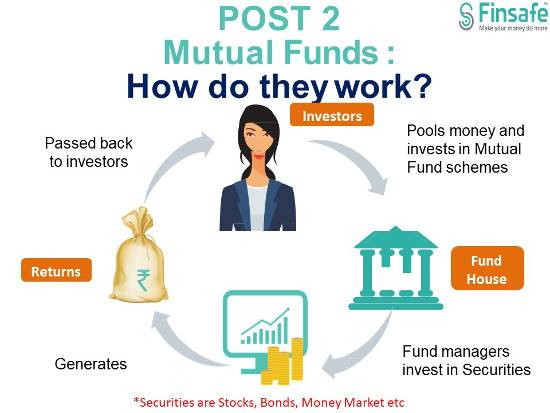When you buy into a mutual fund, your investment can increase in value in three ways:
1. Dividend payments
When a fund receives dividends or interest from the securities in its portfolio, it distributes a proportional amount of that income to its investors.
When purchasing shares in a mutual fund, you can choose to receive your distributions directly, or have them reinvested in the fund.
2. Capital gains
When a fund sells a security that has gone up in price, this is a capital gain. (And when a fund sells a security that has gone down in price, this
is a capital loss.) Most funds distribute any net capital gains to investors annually. In a year with high capital gains payouts, investors may see
a large tax bill, especially high-net-worth individuals who will pay higher capital gains tax rates.
3. Net asset value
Mutual fund share purchases are final after the close of market, when the total financial worth of the underlying assets is valued. The price
per mutual fund share is known as its net asset value, or NAV. As the value of the fund increases, so does the price to purchase shares in
the fund (or the NAV per share). This is similar to when the price of a stock increases — you don’t receive immediate distributions, but the value of your investment is greater, and you would make money should you decide to sell.
Active vs. passive mutual funds A mutual fund's fees and performance will depend on whether it is actively or passively managed.
Passively managed funds invest to align with a specific benchmark. They try to match the performance of a market index (such as the S&P 500),
and therefore typically don’t require management by a professional. That translates into lower overhead for the fund, which means passive mutual
funds often carry lower fees than actively managed funds.
Here are two types of mutual funds popular for passive investing:
1.
Index funds are made up of stocks or bonds that are listed on a particular index, so the risk aims to mirror the risk of that index, as do
the returns. If you own an S&P 500 index fund and you hear that the S&P 500 was up 3% for the day, that means your index fund should be up about
that much, too.
2.
Exchange-traded funds can be traded like individual stocks, but offer the diversification benefits of mutual funds. In many cases, ETFs will
have a lower minimum investment than index funds. ETFs may be more tax-efficient than index funds.
Actively managed funds have a professional manager or management team making decisions about how to invest the fund's money. Often, they try to
outperform the market or a benchmark index, but studies have shown passive investing strategies often deliver better returns.



























